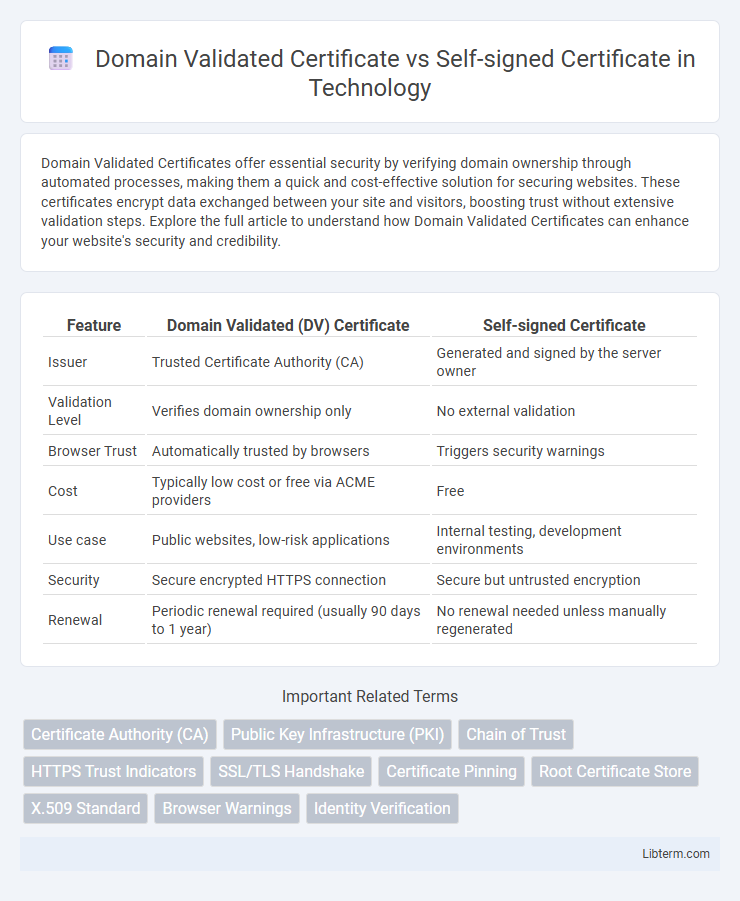Domain Validated Certificates offer essential security by verifying domain ownership through automated processes, making them a quick and cost-effective solution for securing websites. These certificates encrypt data exchanged between your site and visitors, boosting trust without extensive validation steps. Explore the full article to understand how Domain Validated Certificates can enhance your website's security and credibility.
Table of Comparison
| Feature | Domain Validated (DV) Certificate | Self-signed Certificate |
|---|---|---|
| Issuer | Trusted Certificate Authority (CA) | Generated and signed by the server owner |
| Validation Level | Verifies domain ownership only | No external validation |
| Browser Trust | Automatically trusted by browsers | Triggers security warnings |
| Cost | Typically low cost or free via ACME providers | Free |
| Use case | Public websites, low-risk applications | Internal testing, development environments |
| Security | Secure encrypted HTTPS connection | Secure but untrusted encryption |
| Renewal | Periodic renewal required (usually 90 days to 1 year) | No renewal needed unless manually regenerated |
Introduction to Website Security Certificates
Domain Validated (DV) certificates authenticate the website owner's control over the domain through verification methods like email or DNS record checks, providing basic encryption and trust for users. Self-signed certificates are generated by the website owner without a third-party authority, offering encryption but lacking public trust, often triggering browser warnings. Website security certificates play a critical role in encrypting data, ensuring secure communication, and establishing user trust by verifying website authenticity.
What is a Domain Validated (DV) Certificate?
A Domain Validated (DV) Certificate is a type of SSL/TLS certificate that authenticates the ownership of a domain by verifying control over the domain name through automated validation processes. It provides basic encryption and ensures secure communication but does not include any organizational identity information, making it suitable for small websites and personal projects. DV certificates are issued quickly by trusted Certificate Authorities (CAs) and are recognized by browsers as valid security credentials.
What is a Self-signed Certificate?
A self-signed certificate is a type of SSL/TLS certificate that is generated and signed by the same entity without involving a trusted certificate authority (CA). It provides encryption for securing data transmission but lacks third-party validation, which means browsers typically flag it as untrusted, leading to warnings for users. Self-signed certificates are commonly used for internal testing, development environments, or private networks where trusted CA validation is not required.
Key Differences Between DV and Self-signed Certificates
Domain Validated (DV) certificates are issued by trusted Certificate Authorities (CAs) after verifying domain ownership, ensuring secure HTTPS connections recognized by browsers. Self-signed certificates lack third-party validation, making them suitable mainly for internal testing or development, as browsers flag them as untrusted. The key difference lies in trust level: DV certificates provide verified, publicly trusted encryption, while self-signed certificates offer encryption without identity assurance.
Validation Process: DV vs Self-signed Certificates
Domain Validated (DV) Certificates undergo a rigorous validation process where the Certificate Authority (CA) verifies domain ownership through email, DNS records, or HTTP file uploads to ensure authenticity. Self-signed Certificates bypass external validation entirely, as they are generated and signed by the entity that owns the server, causing browsers to flag them as untrusted. The stringent validation of DV Certificates provides a higher level of trust and security compared to self-signed certificates, which are typically used for internal testing or development environments.
Trust Levels and Browser Compatibility
Domain Validated (DV) Certificates are issued by trusted Certificate Authorities (CAs) after verifying domain ownership, resulting in high trust levels and seamless browser compatibility across major platforms like Chrome, Firefox, and Safari. Self-signed Certificates lack third-party validation, leading to low trust levels and security warnings in virtually all browsers, which can deter users and reduce credibility. DV Certificates ensure encrypted connections recognized as secure by browsers, while self-signed certificates are primarily suitable for internal testing or development environments.
Security Implications and Vulnerability Risks
Domain Validated (DV) Certificates are issued by trusted Certificate Authorities (CAs) after verifying domain ownership, ensuring encrypted communication and reducing risks of man-in-the-middle attacks. Self-signed Certificates lack third-party validation, making them vulnerable to spoofing, phishing, and trust issues since browsers do not inherently trust them. Consequently, DV Certificates provide stronger security guarantees for establishing verified and secure connections compared to Self-signed Certificates, which are suitable primarily for internal or development environments.
Use Cases for DV Certificates
Domain Validated (DV) Certificates are ideal for websites requiring quick and cost-effective SSL encryption, such as personal blogs, informational sites, and small business websites, where basic authentication of domain ownership is sufficient. These certificates provide encryption and establish trust by confirming domain control through automated validation processes without extensive identity checks. DV Certificates are commonly used when rapid deployment and secure communication are priorities, but organizational authentication or extended validation is not necessary.
Use Cases for Self-signed Certificates
Self-signed certificates are primarily used in internal testing environments, development servers, and intranet applications where trust chains with external certificate authorities are unnecessary. They provide encryption and authentication locally without incurring costs associated with Domain Validated (DV) Certificates. This makes self-signed certificates ideal for secure communications during software development and internal network operations.
Choosing the Right SSL Certificate for Your Website
Domain Validated (DV) Certificates offer trusted encryption verified by certificate authorities, ensuring visitors that your website is secure and authentic. Self-signed Certificates provide encryption but lack third-party validation, making them suitable primarily for internal testing or development environments. Choosing the right SSL certificate depends on your website's purpose, trust requirements, and the need for public verification to guarantee visitor confidence and data protection.
Domain Validated Certificate Infographic

 libterm.com
libterm.com